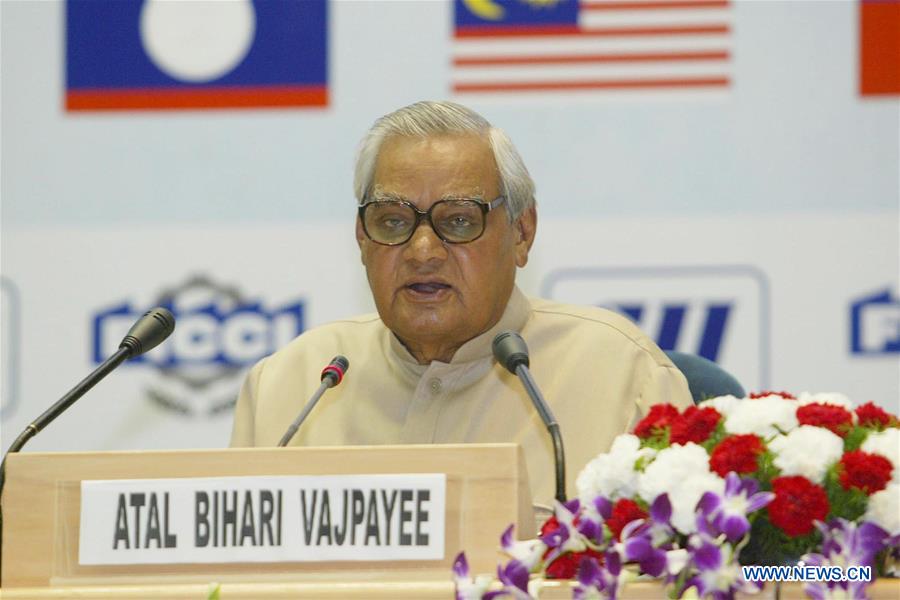In Vajpayee's demise, India lost its last statesman
- By Niranjan Sahoo
 0 Comment(s)
0 Comment(s) Print
Print E-mail China.org.cn, August 30, 2018
E-mail China.org.cn, August 30, 2018

Day after India celebrated its 72nd Independence Day, the country lost its last recognizable statesman. A poetic politician, an orator par excellence and a graceful negotiator, Atal Bihari Vajpayee was a multi-faceted personality loved and admired even by his arch rivals across the political spectrum. The surest proof was demonstrated at his funeral ceremony on August 17 which witnessed tributes pouring in from every major political party in India including the archrival Congress Party which said the "country lost its great son".
In the demise of Vajpayee, a three-time prime minister who successfully led coalition governments between 1998-2004, India lost its tallest non-Congressional leader who made "center-right" politics possible in India. Himself a pacifist, Vajpayee is someone who took huge risks to put India on the path to become a nuclear country in 1999. As a politician, he was a unifier and accommodator who was trusted by his opponents as well. This is what persuaded the then prime minister P.V. Narasimha Rao to request Vajpayee, the then leader of opposition to lead the Indian delegation in 1993 to the United Nations Human Right Commission meeting at Geneva on the Kashmir resolution.
The subcontinent and the Asian region in general have lost an able statesman whose statecraft and external outreach was only matched by India's first prime minister Jawaharlal Nehru's vision on the roles of restraint and non-alignment in foreign policy. This is despite the fact that Vajpayee led India's first right-wing government that was intrinsically opposed to Nehru and his ideas of restraint and non-intervention. Two standout examples of this can be seen from his dealings with Pakistan and China.
Dealing with Pakistan
If there is one major foreign policy legacy that Vajpayee can be really credited with, it is in regard to his courageous gesture to Pakistan even in the background of the Kargil war. It may be recalled that in May 1999, to avenge India's 1984 occupation of the Siachen glacier, the Pakistan military made an illegal venture into the Kargil-Dras sector of India's Jammu and Kashmir state.
While Vajpayee demonstrated strong leadership in pushing back the Pakistani army from Kargil in a decisive military victory, he restrained the Indian army not to breach the Line of Control (LoC). He made hard efforts in convincing army and a raucous public not to expand the conflict beyond the point of contention.
Yet, what stands for greater praise is the fact that he invited General Pervez Musharraf, the man responsible for the Kargil misadventure to Agra for a summit level talk. Although this much publicized summit in 2001 collapsed before it could take off, organizing such an event under the backdrop of the Kargil conflict under heavy domestic pressures was something only statesmen do.
He had to endure lots of flak from his own Bharatiya Janata Party and its sister organizations which are obsessively inimical to the idea of Pakistan. Unlike his predecessors, Vajpayee was willing to take risks on Kashmir solutions to build a sustainable process for peace with Pakistan. Notwithstanding his failed Lahore visit and disastrous Agra Summit, his pragmatism and honest efforts were having telling positive effects. For the first time, he could obtain General Musharraf's assurance to not allow Pakistan's territory to support terrorism in any manner.
Thaw with China
As a visionary and statesman, it was Vajpayee who saw benefits in having a thaw with China. Despite his party's (then Jan Sangh) strong antipathy towards China, as prime minister Moraji Desai's external affairs minister, Vajpayee was the first high ranking politician to visit China in two decades. His February 1979 visit to the People's Republic of China and series of meetings with his counterpart Huang Hua led to subsequent talks on boundary issues and created conditions for future visits which Rajiv Gandhi's government utilized to great advantage.
After he became prime minister of the country, Vajpayee made a high-profile outreach trip to China in 2003. The importance of this visit cannot be ignored. Apart from officially recognizing Tibet as part of China's mainland, he deftly negotiated with his Chinese counterparts to set up a Special Representatives mechanism for deliberating and resolving the border dispute between the two countries.
He went a step ahead and appointed Brajesh Mishra, his principal secretary and national security adviser as the first Special Representative to address the decade's long border issues among others. This clearly sent a strong message to the Chinese leadership about his intent to thaw the volatile relationship.
While his passing will be difficult to bridge, the legacy that he leaves behind will make South Asia and the whole of Asia a much more stable and peaceful region to live in and with.
Niranjan Sahoo is a senior fellow from the Observer Research Foundation, New Delhi.
Opinion articles reflect the views of their authors, not necessarily those of China.org.cn.






Go to Forum >>0 Comment(s)